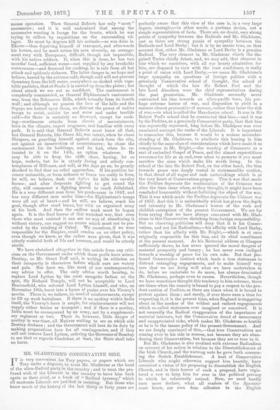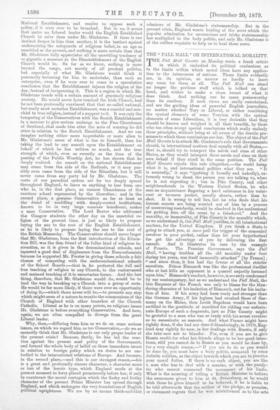MR. GLADSTONE'S CONSERVATIVE SIDE.
IT is very convenient for Tory papers, or papers which are Tory under a disguise, to treat Mr. Gladstone as the head of the ultra-Radical party in the country ; and to treat the pro- found wish of the Liberals in the country to have him back again as their chief, as a freak of " Radical tyranny," which all moderate Liberals are justified in resisting. But those who know much of the history of the last thirty or forty years are
perfectly aware that this view of the case is, in a very large degree, strategic,—in other words, a partisan device, not a simple representation of facts. There are, no doubt, very strong points of sympathy between the Radicals and Mr. Gladstone, Just as there are strong points of sympathy between the Radicals and Lord Derby ; but it is by no means true, on that account that, either Mr. Gladstone or Lord Derby is a genuine Radical. The very element in Mr. Gladstone which the dis- guised Tories chiefly detest, and, we may add, that element in him which we ourselves, with all our hearty admiration for him, are disposed to view with the least confidence, is really a point of union with Lord Derby,—we mean Mr. Gladstone's large sympathy on questions of foreign politics with a genuinely Conservative school of thought, the school of thought of which - the late Sir Robert Peel and the late Lord Aberdeen were the chief representatives during the past generation. Mr. Gladstone assuredly never contracted his bias towards an ultra-pacific tone, his per- haps extreme horror of war, and disposition to yield in a manner almost provocative of menace, rather than incur the risk of war,—in what is called the Manchester school. It was in Sir Robert Peel's school that he contracted that bias,—and it was by the Peelites, as a genuinely Conservative party, that that bias was repeatedly expressed, long before Mr. Gladstone was ever numbered amongst the ranks of the Liberals. It is important to remember this, because it would be a serious misunder- standing of Mr. Gladstone, to attribute this leaning in him chiefly to the same class of considerations which have made it so conspicuous in Mr. Bright,—the worship of Commerce as a sort of embodied Gospel of Peace, and the almost superstitious reverence for life as an end, even when to preserve it you must sacrifice the aims which make life worth living. In the school of the late Sir Robert Peel, on the other hand, the bias towards peace was deeply rooted in statesmanlike caution, in that dread of all vague and rash undertakings which is at the very heart of Conservatism proper. This it was that made the Peelites deprecate the continuation of the Crimean war after the time came when, as they thought, it might have been concluded honourably without forfeiting the object of the war. This it was which made the Peelites deprecate the Chinese war of 1857. And this it is undoubtedly which has given the depth and intensity to Mr. Gladstone's horror of the rash and childish enterprises of the present Government. We are far from saying that we have always concurred with Mr. Glad- stone in this Conservative shrinking from foreign responsibility. But no observing politician will deny that it is his Conser- vatism, and not his Radicalism,—his affinity with Lord Derby, rather than his affinity with Mr. Bright,—which is at once originally responsible for this bias, and its chief constituent at the present moment. As his Rectorial address at Glasgow sufficiently shows, he has never ignored the moral dangers of material prosperity and luxury ; he has never even inclined towards a worship of peace for its own sake. But that pro- found Conservative instinct which leads a true statesman to distrust entangling engagements, and to make himself very sure that we are doing well what we have undertaken to do, before we undertake to do more, has always dominated Mr. Gladstone, perhaps even to excess. Nevertheless, though we have sometimes thought this tendency in him extreme, there are times when the country is bound to pay a respect to the pru- dent caution of Peelites, as there are times when it is bound to protest against them ; and surely, if ever there were a time for respecting it, it is the present time, when England is staggering about in the meshes of the wildest and rashest engagements which so-called statesmen ever imagined or conceived. It is not assuredly the Radical exaggeration of the importance of material interests, but the Conservative dread of unnecessary and unappreciated risks, which makes Mr. Gladstone so hostile as he is to the insane policy of the present Government. And we are deeply convinced of this,—that true Conservatives are coming over to his side in masses, not because they are aban- doning their Conservatism, but because they are so true to it. But Mr. Gladstone is also credited with extreme Radicalism on account of his action in relation to the Disestablishment of the Irish Church, and the warning note he gave forth concern-
ing the Scotch Establishment. A host of Conservative Liberals who might otherwise support him heartily, have conceived a vision of his proposing to disestablish the English Church, and in their horror of such a proposal, have regis- tered a vow to keep him for ever in the political privacy to which he voluntarily retired. Now, we need hardly once more declare, what all readers of the Spectator must know, our own firm adhesion to the English National Establishment, and resolve to oppose such a policy, if it were ever to be broached. But to us, it seems that under no Liberal leader would the English Established Church be safer than under Mr. Gladstone. If there is one instinct deeper in him than another, it is the instinct against undermining the safeguards of religious belief, in an age so unsettled as the present, and nothing is more certain than that Mr. Gladstone fully appreciates all the unsettling tendency of so gigantic a measure as the Disestablishment of the English Church would be. So far as we know, nothing is more beyond the range, not merely of all prudent politics, but especially of what Mr. Gladstone would think it personally becoming for him to undertake, than such an enterprise, even if he were ever to come to a speculative conclusion that the Establishment injures the religion of the day, instead of invigorating it. This is a region in which Mr. Gladstone treads with a certain amount of genuinely religious anxiety. He would never have touched the Irish Church, had he not been profoundly convinced that that so-called national, but really most sectarian Establishment, was a scandal and mis- chief to true religion, instead of a support to it. It was only the tampering of the Conservatives with the Scotch Establishment in a manner to give serious umbrage to the Free Churchmen of Scotland, .that made him utter the note of warning he did utter in relation to the Scotch Establishment. And we can imagine nothing either more improbable or more alien to Mr. Gladstone's sense of what is due to himself, than his taking the lead in any assault upon the Establishment on behalf of which he has written so much, and the true strength of which, even as recently as the time of the passing of the Public Worship Act, he has shown that he deeply realized. An assault on the national Establishment may come from the side of the Radicals, or it may pos- sibly even come from the side of the Ritualists, but it will never come from any party led by Mr. Gladstone. The roots of our parochial system are far too deeply spread throughout England, to leave us anything to fear from one who is, in the first place, an earnest Churchman of the cautious school represented by the Guardian; and in the second place, a genuine Conservative so far at least as the dread of meddling with deeply-rooted institutions, known to be in very large measure beneficent, makes a man Conservative. The Lord Rector who addressed the Glasgow students the other day on the unsettled re- ligion of the present time, is just as likely to propose laying the axe to the root of the English Establishment, as he is likely to propose laying the axe to the root of the British Monarchy. The Conservatives should never forget that Mr. Gladstone, from the first introduction of the Educa- tion Bill, was the firm friend of the fuller kind of religious in- struction, as it is given in the denominational schools, and inpurred a good deal of displeasure from the Nonconformists because he supported Mr. Forster in giving these schools a fair chance of competing with the undenominational schools of the School Boards ;—that is, he preferred the full and free teaching of religion in any Church, to the embarrassed and maimed teaching of it in unsectarian forms. And the last thing, therefore, that Mr. Gladstone would do, would be to lead the way in breaking up a Church into a group of sects. He would be far more likely, if there were ever an opportunity of doing it,—which there never will be,—to promote any step which might seem of a nature to reunite the communions of the Church of England with other branches of the Church Catholic. Liberal as he is on many points, on religious issues Mr. Gladstone is before everything Conservative. And here, again, we are often compelled to diverge from the great Liberal leader.
Why, then,—differing from him as we do on some serious issues, on which we regard him as too Conservative,—do we so earnestly think that Mr. Gladstone is our only proper leader at the present crisis ? Because, firstly, he has led the reac- tion against the present mad policy of the Government, and formed the whole body of belief on those immediate issues in relation to foreign policy which we desire to see em- bodied in the international relations of Europe. And because, in the second place,—and this is our strongest reason,—his is a great and profoundly sincere character, a character more or less of the heroic type, which England needs at the present moment to have placed prominently before her, if only to counteract the moral contagion which the flashy and frothy character of the present Primo Minister has spread through England, and which endangers the very foundations of English political uprightness. We are by no means thick-and-thin admirers of Mr. Gladstone's statesmanship. But in the present crisis, England wants healing of the sores which the popular admiration for unveracious and tricky statesmanship has multiplied in the body politic, and only Mr. Gladstone is of the calibre requisite to help us to heal these sores.







































 Previous page
Previous page